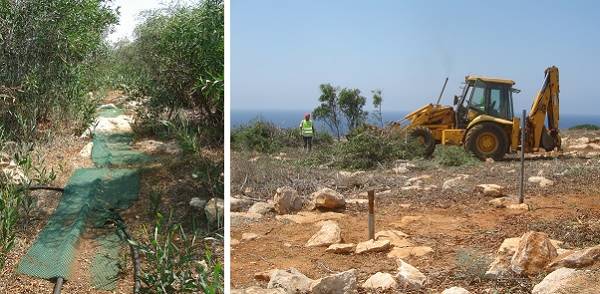
Like a number of areas in Cyprus, particularly in the south and southeast, Dhekelia or the Eastern Sovereign Base Area (ESBA) has a very serious problem with illegal bird trapping. In their autumn 2014 report on trapping activity, BirdLife Cyprus estimated that the approximate number of individual birds killed in the ESBA last autumn was in the high hundreds of thousands. Walking some of the illegally-planted and irrigated blocks of non-native Acacia in the Cape Pyla firing ranges illuminates the grim reality of this seemingly astronomical figure. In an otherwise barren coastal landscape, these artificial green oases act as a powerful magnet for passerines as they migrate south on a broad front. Well maintained mist-net rides – complete with permanent net pole bases buried in the soil or drilled into the bedrock – intersect the Acacia plantations with alarming frequency. Many kilometres (and many thousands of Euros) worth of irrigation pipes criss-cross the stony ground. Here and there, once-buried electric cables have been exposed; evidence of the extensive use of playback lures.
Last November the ESBA began a programme of Acacia clearance on the Cape Pyla ranges, successfully removing about 10% of the Acacia from the fringes of the key trapping area. Building on this, work to clear a 22-acre (90,000 square metre) patch in one of the worst trapping areas started last week. As well as removing the illegally created habitat on which the bird trappers rely, these efforts will have important additional conservation benefits. Cape Pyla is in the process of being designated as a Special Area of Conservation (SAC), predominantly for its botanical value. Removing invasive non-native plant species is an integral part of SAC management and will allow the specialist native flora to flourish. There’s a direct functional benefit for the British Bases too: the Pyla Range is relatively small, so the dense stands of Acacia and associated irrigation pipes compromise its usefulness and safety as a training area for troops.
Illegal bird trapping activity in Cyprus has been monitored annually since 2002, using the survey methodology outlined by RSPB Senior Conservation Scientist Simon Wotton at the OSME Summer Meeting 2015. It is hoped that the ongoing Acacia clearance will play an important part in reducing the level of this illegal activity and in turn make Cyprus a safer place for migratory birds.
For updates, follow BirdLife Cyprus and the British Forces Cyprus on Twitter.
Acacia non-native illegal bird trapping Cyprus Cape Pyla
